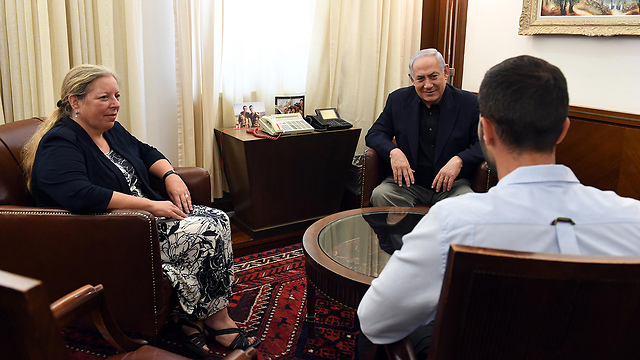
Funeral of Jordanian landlord killed in Israeli Embassy shooting incident
צילום: EPA
Israel’s failed foreign policy
Op-ed: Crisis with Jordan following embassy shooting could have been solved through three simple measures, but both National Security Council and Foreign Ministry have become neutralized bodies. If prime minister himself fails to personally initiate or lead diplomatic activities—nothing happens.
Two events took place simultaneously about two months ago: A terror attack at the Temple Mount, which left two Border Police officers dead and the metal detector saga that followed, and the incident in which an Israeli security guard shot to death a young man who attacked him in his apartment in Jordan.

These two incidents increased the tensions between the two countries. The Jordanian king is angry and is refusing to let the Israeli ambassador return to Amman. His anger is justified, as the Israeli security guard also shot to death his landlord, who was present at the apartment at the time and was likely uninvolved in the incident.
In this state of affairs, Israel would have been expected to do three simple things: One, to appoint a professional team to investigate the shooting incident. There is no need for a police investigation here. A professional team would have completed the investigation and prepared a detailed report within two weeks. The team should have been led by a well-known security official. Had that been done, and had the head of the team presented the report to the Jordanians as early as a month ago, the affair would already be over by now.

Prime Minister Benjamin Netanyahu’s meeting with Israeli Ambassador to Jordan Einat Shlain and the Israeli security guard who shot two people to death in his apartment in Amman (Photo: Haim Zach, GPO) (צילום: חיים צח, לע"מ)
In 2003, at the height of the intifada, during a Duvdevan Unit activity near the United Nations camp in Jenin, the force’s commander detected a person with a suspicious object in his hand, assumed it was a gun and ordered his soldiers to shoot him to death. It later turned out that the man had been holding a phone. He was a senior British intelligence official, who had volunteered to serve as head of the UN office in the area. Israel got into trouble both with Britain and with the UN.
At the time, I served as head of the IDF Planning Directorate and was appointed to lead the team investigating the incident. Within a week, I traveled with the findings to the UN secretary-general in New York and to the British deputy foreign secretary in London. I admitted to them that professional mistakes had been made, unintentionally. The tensions were over.
The second thing Israel should do is launch a professional dialogue with the Jordanians about the security arrangements at the Temple Mount. Now that calm has been restored, along with the prayer routine, it’s time to hold consultations with Jordan about future solutions or acceptable responses to different scenarios. That isn’t happening either, as far as I know.
The third thing is to appoint a person of stature as the Israeli ambassador. The current ambassador, Einat Shlain, is obviously a persona non grata in Amman after she was photographed with the prime minister when he greeted the security guard. The next ambassador shouldn’t be an anonymous diplomat from the Foreign Ministry but a well-known Israeli figure, a former minister or a security official who is highly regarded by the Jordanians. Jordan is one of the 10 most important countries to Israel, the relations between the two countries are explosive, there is a high potential of deterioration, which it why it is very important to appoint a top official as the ambassador.
The three things I just mentioned—a quick investigation of the incident by a senior team and a presentation of the findings to the king of Jordan, initiating a dialogue on the Temple Mount and appointing an ambassador with a very good reputation—are simple measures with hardly any cost.
It has already been said that a national interest is not a heart’s desire. A national interest is something so important that we should be willing to pay a price to achieve it. In this case, we are talking about a top interest which can be achieved with hardly any cost. This isn’t happening because both the National Security Council and the Foreign Ministry have become neutralized bodies. If the prime minister himself fails to personally initiate or lead diplomatic activities—nothing happens.
As talented as the prime minister may be, this isn’t the way to run a foreign policy. The failure in handling the crisis with Jordan is likely just one example.
Major-General (res.) Giora Eiland is a former head of Israel's National Security Council.










